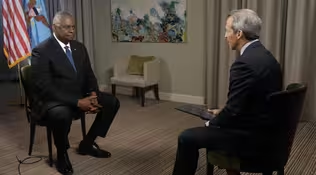
Why the U.S. is detaining thousands of migrants as witnesses
Clip: 10/14/2023 | 5m 24sVideo has Closed Captions
Why thousands of migrants are being detained by the U.S. as witnesses
Over the past 20 years, tens of thousands of undocumented immigrants have been sent to jail and held as potential witnesses in human smuggling cases, many for six months or longer. A New York Times investigation examined this largely overlooked aspect of the immigration debate. Sarah Cutler, the lead author of the investigation, joins John Yang to discuss.
Problems playing video? | Closed Captioning Feedback
Problems playing video? | Closed Captioning Feedback
Major corporate funding for the PBS News Hour is provided by BDO, BNSF, Consumer Cellular, American Cruise Lines, and Raymond James. Funding for the PBS NewsHour Weekend is provided by...

Why the U.S. is detaining thousands of migrants as witnesses
Clip: 10/14/2023 | 5m 24sVideo has Closed Captions
Over the past 20 years, tens of thousands of undocumented immigrants have been sent to jail and held as potential witnesses in human smuggling cases, many for six months or longer. A New York Times investigation examined this largely overlooked aspect of the immigration debate. Sarah Cutler, the lead author of the investigation, joins John Yang to discuss.
Problems playing video? | Closed Captioning Feedback
How to Watch PBS News Hour
PBS News Hour is available to stream on pbs.org and the free PBS App, available on iPhone, Apple TV, Android TV, Android smartphones, Amazon Fire TV, Amazon Fire Tablet, Roku, Samsung Smart TV, and Vizio.
Providing Support for PBS.org
Learn Moreabout PBS online sponsorshipJOHN YANG: Over the past 20 years, tens of thousands of undocumented immigrants along the southern border have been sent to jail, hundreds of them for six months or longer.
They weren't sent to jail because they'd been charged with a crime.
They were being held as material witnesses against the people accused of helping them cross the border.
A New York Times investigation examined this largely over aspect of the immigration debate, they found that the material witness law has been administered haphazardly, often with little regard for the constitutional rights that apply to all people inside U. S. borders.
Sarah Cutler is the lead author of the times investigation and a fellow here at the NewsHour.
Sarah, in your article you've got a story about a young woman from Guatemala who was pregnant when she was sent to jail.
What happened to her?
SARAH CUTLER: Yes, that was a really tough story.
This was a woman who was 26, came from Guatemala to seek asylum in the United States, and she was chosen, selected as a witness.
And while she was detained, she gave birth.
She gave birth zip tied with U.S.
Marshals standing watch in the hospital.
And after three days after the birth, she was forced to give up her child.
Her sister was going to come pick up the child, and she wasn't reunited with the child for another two months.
And what really jumped out to us about this story is that after all of this happened to her, she never actually gave testimony.
JOHN YANG: How common is that?
SARAH CUTLER: That's actually very common, because in the vast majority of cases, over 99 percent of cases, these cases don't go to trial.
They end in a plea bargain.
A plea deal.
So it's very common, actually, for witnesses to be detained, but not actually give testimony.
JOHN YANG: Let's take a step back.
Why are these witnesses in jail to begin with?
SARAH CUTLER: Right.
This is actually the material witness law is very old.
It goes back to George Washington's presidency and the original intent, or many of its uses have been in cases where a witness may be afraid of a defendant may not want to testify, perhaps a situation like gang violence.
But basically, the law says if a witness has material very important information and there's reason to believe the witness won't come to trial, then that is sufficient to hold a witness in jail.
So in this situation, because these folks are undocumented, the claim is that they either will flee and won't show up to trial, or they might actually be deported before the trial takes place.
So there is a bit of a disconnect between the courts and immigration.
The idea that you might be deported before the courts are done with you.
JOHN YANG: What kind of conditions are they held under?
Are they being held literally like a criminal defendant?
SARAH CUTLER: Yes.
So in many cases, folks are held.
They're in U.S.
Marshals custody and U.S.
Marshals contracts with a range of federal facilities, local jails.
So we spoke to one sheriff in Laredo.
Or in a facility that holds most of Laredo's material witnesses, and he said, yes, these folks are wearing the same uniform, the orange uniform.
They have to be handcuffed and ankle cuffed during transit.
So they are in many cases, treated just like prisoners.
JOHN YANG: What surprised you the most in your reporting?
SARAH CUTLER: I think what really jumped out to me was that we continued from a lot of folks, we heard this perception that, you know, you are here illegally.
You committed a crime by coming to the country illegally, so you could be in jail for that crime.
But what we learned, which was surprising, is that, especially since COVID it's quite common that folks who are charged for coming illegally for the first time, illegal entry, receive very short, very light sentences, perhaps time served or a couple of days.
So the irony is that you may spend more time in custody as a witness than you would have if you had been charged for the crime offendering illegally.
JOHN YANG: And as I said, this has been going on for two decades, for 20 years.
Talk about sort of the how many we've seen since the George W. Bush administration.
SARAH CUTLER: Right.
So those numbers went up significantly under the Bush administration.
They went up significantly under the Trump administration.
They dipped with the onset of COVID I think there was a slowdown in prosecuting smuggling cases, but we have seen them rise again, so those numbers do continue to stay pretty high.
JOHN YANG: And this is an overlooked aspect.
Why do you think no one's been saying more about this?
There aren't more advocates talking about this.
SARAH CUTLER: Yeah, that was something that surprised us as well.
I think that along the border this is fairly well known that this practice occurs, but away from the border less so.
And I would say that it's because these folks kind of fall through the cracks.
They're not looking at as much potential jail time as a defendant in a case like this.
And so there's not as much focus on them from the court's perspective.
And I think that it's just something that's fallen through the cracks for that reason.
JOHN YANG: And under the material witness law, is there any limit in the law about how long they can be held?
SARAH CUTLER: The law does not specify a limit.
It says you can be held for a reasonable period of time and actually kind of advocates that your testimony be taken by a video deposition and then you be released quickly because it's not specifically stated.
There's a wide variation along the border.
So, for example, in Arizona, there tends to be in Tucson there's a 30-day limit typically.
In New Mexico, actually, they've found a way to let most of their witnesses out on bond or into the community until trial.
Whereas in Laredo, for example, folks tend to be held until trial as long as they're needed.
JOHN YANG: And is this variance is just judge by judge, court by court.
SARAH CUTLER: It totally varies.
Sometimes there's local rules at a district level, sometimes there's standing orders in a court, but it varies.
There's no uniform policy coming down from DOJ governing how this should happen.
JOHN YANG: Sarah Cutler, thank you very much.
SARAH CUTLER: Thank you for having me.
Austin: U.S. will do ‘everything we can’ to support Israel
Video has Closed Captions
Clip: 10/14/2023 | 6m 39s | Defense Secretary Austin says U.S. will do ‘everything we can’ to support Israel (6m 39s)
Desperation in Gaza as Israel prepares for next phase of war
Video has Closed Captions
Clip: 10/14/2023 | 3m 29s | Israel prepares for next phase of war as Gaza residents scramble to flee (3m 29s)
Study finds systemic barriers to cancer treatment for women
Video has Closed Captions
Clip: 10/14/2023 | 6m 8s | New study highlights systemic barriers to cancer treatment for women (6m 8s)
Providing Support for PBS.org
Learn Moreabout PBS online sponsorshipSupport for PBS provided by:
Major corporate funding for the PBS News Hour is provided by BDO, BNSF, Consumer Cellular, American Cruise Lines, and Raymond James. Funding for the PBS NewsHour Weekend is provided by...














